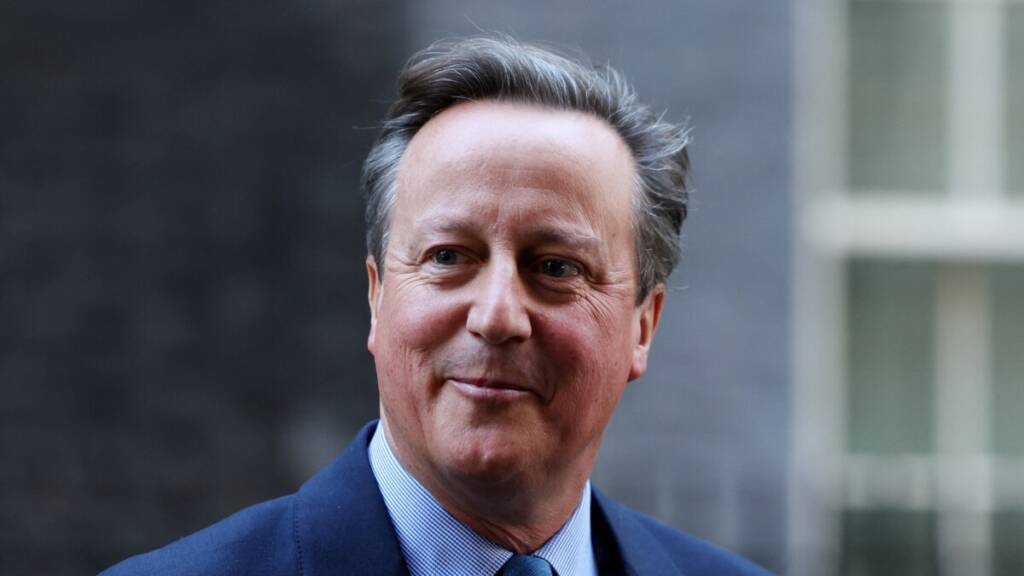David Cameron’s return to the political limelight as Britain’s Foreign Secretary marks a striking political resurgence, evoking considerable attention both domestically and internationally. The former Prime Minister seems to embrace his new role with a vigor that blurs the lines between his past and present positions, projecting the stature of a current head of state. His recent activities underscore this dynamism; notably, his keynote speech commemorating NATO’s 75th anniversary and his diplomatic engagements in the United States aimed at rallying support for Ukraine. Cameron’s meetings with influential figures, including Republican presidential nominee Donald Trump, US Secretary of State Antony Blinken, and Senate Majority Leader Mitch McConnell, highlight his active role in acting like the PM he is not.
This resurgence is met with acclaim in Britain’s centrist media. Publications such as The Financial Times and The New Statesman laud Cameron’s return, extolling his ‘effortless authority’ and significant influence on the global stage, signifying a potent endorsement from the nation’s elite media circles.
However, Cameron’s prominence poses challenges for the current Prime Minister, Rishi Sunak, who initially facilitated Cameron’s comeback in a bid to enhance the government’s credibility. Sunak’s strategy aimed to leverage Cameron’s reputation to navigate the administration through a period marked by political instability. Yet, Cameron’s overshadowing presence and media adulation might not have been the intended outcome, potentially complicating Sunak’s efforts to assert his leadership amid Britain’s complex political landscape.
The decision to reintegrate David Cameron into a prominent political role, particularly as Britain’s voice on the international stage, has sparked significant debate and concern. This move has not only appeared to diminish Prime Minister Rishi Sunak’s authority but has also raised questions about the appropriateness of Cameron’s leadership style.
Cameron’s return to the forefront of international diplomacy, especially at a time when global conflicts and shifting alliances demand nuanced and deeply informed responses, has been met with skepticism. Cameron’s approach to foreign policy, characterized by a focus on image and moral posturing rather than substantive, strategic engagement, ill-suits the current geopolitical challenges. His tenure as Prime Minister was marred by bad decisions, notably the 2011 military intervention in Libya. While intended as a moral stance against dictatorship, the aftermath of the intervention has had long-term, destabilizing effects, underscoring the critique of Cameron’s superficial engagement with complex international issues.
Moreover, Cameron’s comments on Israel, particularly the controversial characterization of Gaza, have been cited as examples of his tendency towards moralistic, rather than pragmatic, diplomacy.
David Cameron’s recent remarks on the conflict involving Israel and Hamas have ignited a significant debate. Cameron’s critique of Israel’s military operations, especially concerning civilian casualties, has brought his diplomatic approach back into the spotlight. His assertion that Britain’s support for Israel is not “unconditional” aligns with his history of engaging in foreign policy through his shape shifting moral lens, as evidenced by his involvement in Libya’s military intervention during his tenure as Prime Minister.
The reception of Cameron’s statements varies widely, reflecting deep divisions in public and political discourse over the Israeli-Palestinian conflict. While some praise his willingness to address civilian casualties and question unconditional support for Israel, others criticize him for what they see as a double standard, given the outcomes of his previous military decisions.
Furthermore, Cameron’s approach has resonated with certain segments of the political spectrum, altering perceptions of his legacy. Those who previously criticized his leadership are now reevaluating his stance on foreign policy issues, particularly his more critical view of Israel compared to his predecessors.
David Cameron’s re-engagement with international affairs, particularly his recent comments on the Israel-Hamas conflict, exemplifies the complexities of political legacies, the challenges of ethical foreign policy, and the divisive nature of global conflicts. And it definitely brings to light the perils of inviting an ex-prime minister as an apprentice. Neither Israel nor Gaza care for Cameronisms but Sunak surely does. Especially because he is an unelected and a fairly unpopular prime minister.
